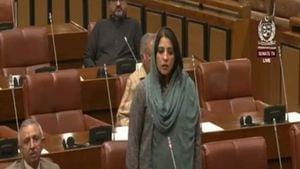The arrest of Dámaso López Serrano, known as ‘El Mini Lic’, unfolded on December 12, 2024, as U.S. authorities apprehended him for charges related to fentanyl trafficking.
According to journalist Luis Chaparro, sources from the Federal Bureau of Investigation (FBI) confirmed this shocking development, marking yet another chapter in the tumultuous saga surrounding López Serrano, whose familial connections and criminal past have made him notorious.
‘El Mini Lic’, the son of Dámaso López Núñez, known as 'El Licenciado', was once considered one of the successors of the infamous Joaquín 'Chapo' Guzmán. This new arrest raises questions about the Sinaloa Cartel’s changing leadership dynamics and operational stability.
López Serrano had previously tasted freedom just over two years ago, on September 16, 2022, after serving a 72-month sentence. His imprisonment stemmed from serious charges; he had pleaded guilty back in 2018 to importing thousands of kilograms of heroin, methamphetamines, and cocaine. The irony of his liberation is palpable, as it granted him limited time as he was still under conditional release until next year, when he would have to face the music once more.
Chaparro shed light on the leniency exhibited by the U.S. legal system. “His freedom (of conditional) was going to end next year. The truth is the laws of the United States had been very lenient with him. He was sentenced to less than 10 years, of which he served five,” he stated, reflecting on the disparities often present within the judicial process.
This recent act of reapprehending López Serrano corresponding to fentanyl trafficking sends ripples through the law enforcement and journalistic communities. His notoriety isn’t solely linked to drug trafficking; he has also been implicated as the mastermind behind the murder of journalist Javier Valdez Cárdenas. Valdez was notable for bravely reporting on the dark underbelly of drug cartels and organized crime, bringing attention to issues often shrouded by power and fear.
There has been strong advocacy for the extradition of López Serrano back to Mexico. Civil organizations, as well as Sinaloa's Governor Rubén Rocha, have called on federal authorities to expedite this process. This extradition could potentially allow for López Serrano to face the charges awaiting him related to Valdez’s murder, throwing light on the harsh reality journalists face when tackling drug trafficking narratives.
Connections to the Sinaloa Cartel and relationships within its hierarchy have led to intense speculation about the future of López Serrano's activities and how his apprehension could impact current operations. For example, during his previous interactions, including one with Chaparro, he insinuated ramifications tied to his family lineage and the political spectrum. He alleged, “the children of Joaquín Guzmán Loera, known as Los Chapitos, operated favorably for former President Andrés Manuel López Obrador during his 2012 and 2018 campaigns.” This admission hints at the ambiguity of drug cartels' roles within political dynamics and the potential for illicit influences on governance.
The political ramifications, intertwined with the criminal underworld, are not lost on observers. The evolution of cartel tactics and their entwinement with political maneuvers may continue to shape Mexico’s drug trafficking narrative, especially with figures like 'El Mini Lic' back under scrutiny.
While supporters of the law push for greater justice, the reality remains bittersweet. The resurfacing of ‘El Mini Lic’ does not just ignite fear for law enforcement but encapsulates the enduring nature of the drug trade and its powerful grip over communities. The processing of López Serrano's case, coupled with his ties to the brutal drug war, holds the potential for inciting conversations about systemic changes needed both within U.S. laws and Mexican governance.
With such developments, the public and authorities are left pondering: What does the future hold for drug cartels, and what must change to combat the unyielding influence they wield on both sides of the border?



